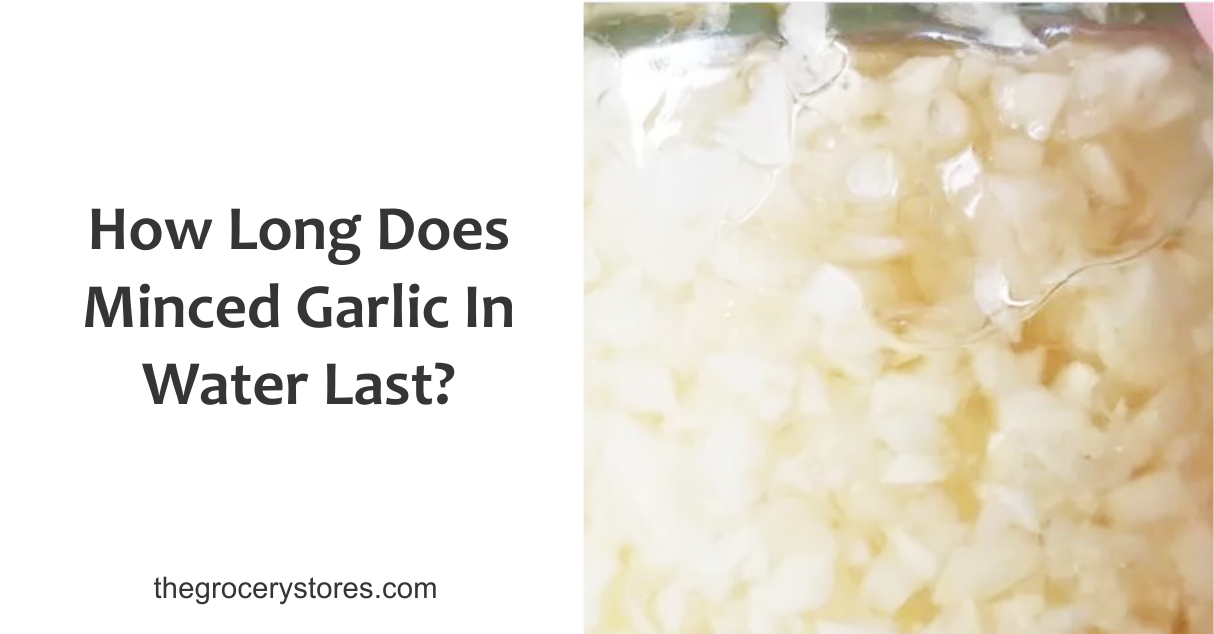Minced garlic is an option for storing garlic for extended periods of time. However, the medium matters a lot. Storing it in olive oil can preserve your garlic for up to three months. However, keeping it in water will make it last only 2 or 3 days.
Follow me in this article as I go into detail, explaining the peculiarities of minced garlic.
Is minced garlic in a jar the same as fresh garlic?
Garlic is one of those necessary ingredients that plays a crucial role in your cooking. It is almost as important as salt and pepper in your food. The taste that garlic gives is quite unique. You will find it important in whatever food you are adding it to.
Whether it is steak or chicken you are marinating, or a casserole you are cooking up, garlic is a vital piece. Your sauce might not taste the same without garlic, and even you will admit that your salad lacks a bit of spice without the presence of garlic.
Garlic can come in different types, and each one serves a different purpose. There are some recipes that will involve you needing freshly chopped garlic and others that won’t. You might want to add fresh chopped garlic to a dish that doesn’t cook for long. You could have raw, pungent garlic on your hands.
Fresh garlic is the one that is bursting with flavor and heat. When peeled just from the cloves and leaves, no other form comes close to its spiciness and warmth to your taste buds. Nevertheless, one of the problems with fresh garlic is the lingering smell that comes with cutting it. Due to this problem, there is an alternative for those who don’t want to get their hands messy or smelly-the jarred garlic.
The differences between these two begin to show themselves. Fresh garlic requires you to whip out your chopping board and a bit of your time. You go through the process of peeling, washing, and chopping fresh garlic. On the other hand, the minced garlic that comes in a jar comes prepackaged and ready for your use. You can easily pick them off the shelves of any nearby store and have them in your dish in minutes.
Raw garlic trumps minced garlic in terms of flavor and vibrancy. It gives off a good spicy feeling with a tinge of heat. Minced garlic on hand can be used when you want a milder flavor in your dish. Because of this difference in spiciness, use 1 teaspoonful of minced garlic for every garlic clove. This is not a strict rule though, you can add as much as you want.
Another thing is convenience. As minced garlic comes prepackaged, it can save you a lot of time and stress. You don’t have to spend all your time trying to separate individual cloves and getting your hands smelly.
Minced garlic is also very inexpensive to procure. The other advantage that minced garlic gives is longevity. Minced garlic can stay in jars for up to 6 to 12 months. Fresh garlic, on the other hand, doesn’t stay fresh, especially when the cloves have been peeled.
Can you freeze minced garlic in water?
If you are looking for a way to have a constant supply of garlic all year long, then freezing garlic is the way to go. However, to preserve garlic, you don’t freeze it in water. Olive oil is the medium of choice. There are several ways and forms in which you can store garlic in the freezer. I will be listing some below. Let’s dive in.
- Fresh garlic bulbs: You can freeze garlic bulbs whole. Just ensure that they are dry and free from any dampness. You can put them into a freezer bag and then seal them tightly. Also check properly to ensure that the garlic bulbs are free from rot or spoilage.
- Freshly peeled garlic: Garlic that has been freshly peeled can also be stored in the freezer. After peeling the skins off, dry them properly and pack them tightly in plastic bags or aluminum foil. Do this to remove as much air as possible. Place these bags or foils into the freezer bag for further protection.
- Chopped or minced garlic: You can also freeze chopped garlic. This will help you in the future, when you are seeking to reduce preparation time. You simply chop the garlic finely to whatever size you desire. Then you place these pieces into a freezer bag, seal them tightly and then freeze.
- Freeze garlic cubes: Garlic cubes can be made from garlic paste in simple steps. The garlic paste is made by adding one tablespoon of olive oil to every head of garlic that is blended. The puree that is made, is then fixed into ice cube trays and then allowed to freeze for some hours. Remove these cubes and then place them in a freezer bag and seal them tightly.
- Freeze roasted garlic: Garlic can be roasted and then transferred to the freezer to preserve it. Place the whole garlic in the oven or under the grill. After that, press on it to bring out the flesh from within. Mash this flesh into a fine consistency, and then place this paste into the freezer. After some hours, place them in freezer bags to store them for any period of time.
How do you know if minced garlic is bad?
Minced garlic is a pleasant alternative to chopping garlic every time you intend to use it. One great thing about minced garlic is its longevity. However, like all vegetables or food products, garlic has an expiry date. When it has spoiled, there are things that you should look out for so you can avoid ingesting it.
One of the things that you should look out for is the off odor. Garlic has its characteristic “garlicky” odor. However, when the minced garlic has spoilt, it will ooze off a different, uncomfortable kind of odor. You should avoid consuming garlic when it is that way.
Another thing to watch out for is the growth of mold and off color. Once you notice mold, it is time to discard.
You should also check the expiry date. To be on the safe side, never consume products that are past their expiry date. Even if it all looks good, it is safer to discard them.
Do you refrigerate minced garlic in a jar?
When the minced garlic is unopened, you don’t necessarily have to refrigerate it. You can store it in your pantry. However, just ensure to monitor the “best before”. Nevertheless, once the garlic jar has been opened, you need to refrigerate it to keep it fresh.
How do you store minced garlic in a jar?
When making homemade minced garlic, which you intend to store, take note of this. Garlic stored in oil at room temperature has the risk of developing botulism.
- Add your minced garlic to a clean, airtight container. Your minced garlic should be placed in a tidy, airtight container.
- Pour in enough oil to cover the garlic completely. Leave a half-inch of room at the top of the jar.
- Seal the containers well, and then write the date that they were sealed on them.
- You can put it in the fridge for up to a week. But if you freeze it, make sure to use it before 3 months are up.
Can spoiled garlic make you sick?
Consuming bad garlic is bad news, unfortunately. You are at a risk of botulism if you consume bad garlic. Food botulism, though quite rare, is caused by Clostridium botulinum, an anaerobic bacteria. This means that it thrives in the presence of low oxygen levels.
People who like to make homemade garlic oil can be at risk of this disease. The bacteria thrives in low oxygen areas, and the combo of the oil and low acidity can trigger it to form spores. That is why it is recommended to never leave homemade garlic oil at room temperature for more than two hours. The bacteria multiply rapidly at room temperature.
Botulinum toxin affects the facial nerves and other nerves connected to the eyes, mouth, and throat. It can cause difficulty in breathing. It also causes dizziness, nausea, and vomiting. In essence, botulism can be fatal if no medical care is received on time.
How long does chopped garlic last in the refrigerator?
Garlic in different forms lasts for different lengths of time. When garlic is still in its untouched form, it can last quite a long time. Whole bulbs can last 3-6 months when stored in the refrigerator. Peeled cloves will last a duration of 10 days.
On the other hand, when garlic has been chopped up, it doesn’t last very long. It can last up to a day. However, if you intend to extend the shelf life, you can immerse the chopped garlic in olive oil. This can give it a boost to stay for up to 2 or 3 more days.

